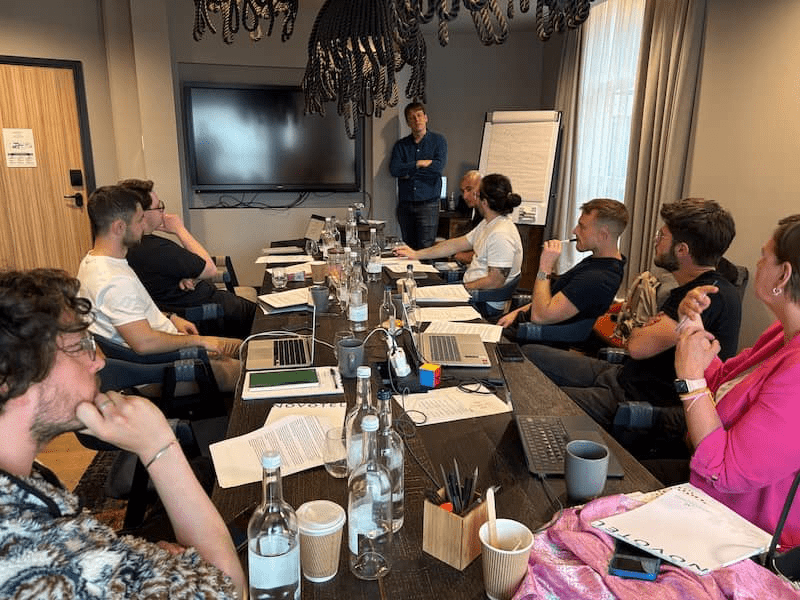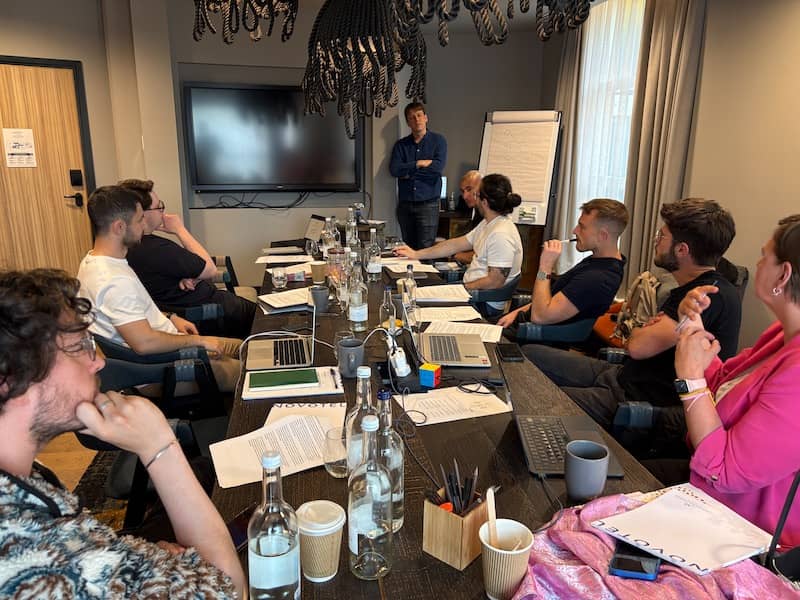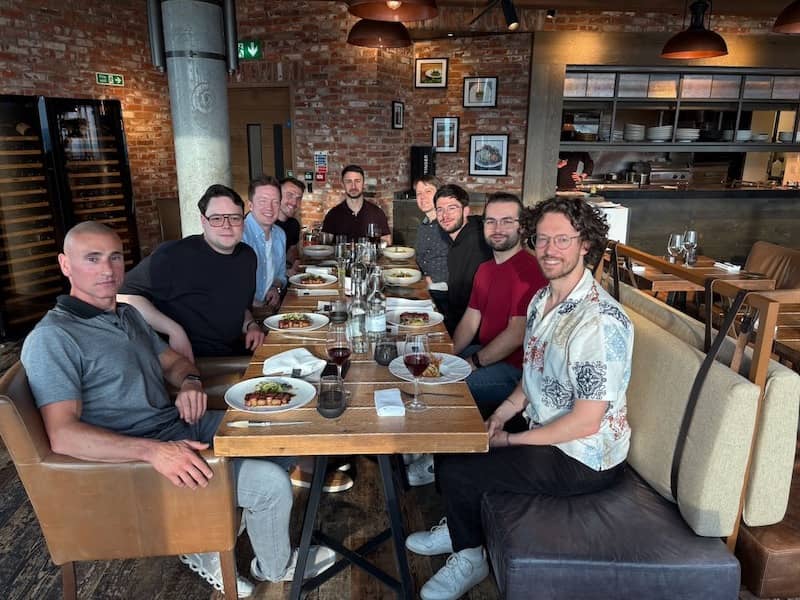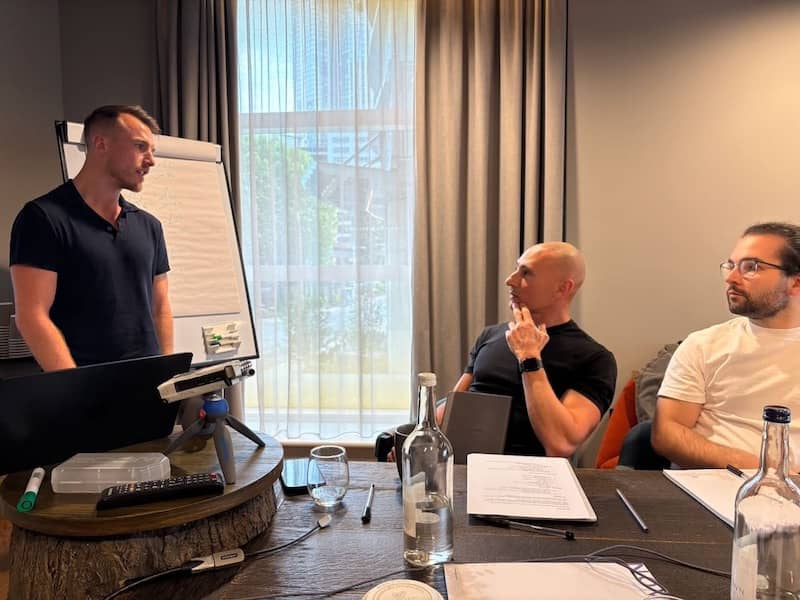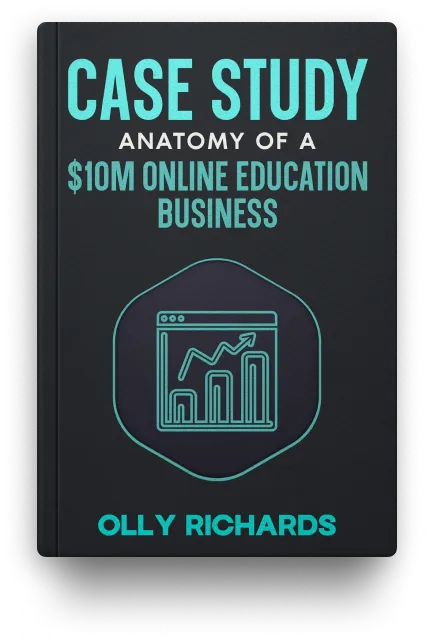Last week I held the first meeting of my 2025 mastermind group in London.
It was a blast…
My mastermind group has 8 entrepreneurs — all online educators.
(It’s small by design. More intimate. Better experience.)
We meet four times a year in London.
It goes like this:
- People fly in and we meet for dinner the night before
- I put everyone up in a nice hotel
- We spend the next day holed away strategising
I won’t go into the details here, because next week I’m going to share a write-up on the event from one of the participants (if Kieran ever gets his act together and writes it ).
But in this email I wanted to take a different tack and reflect on how this group actually came to be.
See, despite running many, many events in the past, this is the first private mastermind group I’ve run for my own business, and I knew I wanted it to be great.
But I also knew something important — it needed to be an MVP.
MVPs are one of the core strategic principles of growing a business.
Everyone knows what it is, but it’s a lesson I find I have to keep learning. No matter how “important” your new project is, there’s a truth you cannot escape:
Your vision WILL change when it makes contact with reality.
And for that reason, you always have to ask how you can run a minimally viable product with nothing but the essence in place.
Example:
You might be wondering why my “2025 group” is starting now, in May.
Well, I launched this group back in New Year time, with a video I shot neck-deep in snow in a hot spring in northern Japan.
I actually screwed it up.
See, there was tonnes of interest, but I the mistake I made was to launch the group with the first meeting planned only 6 weeks later, in mid-February.
Sure enough, it was too soon for people, and proved to be a major stumbling block.
So I immediately reacted and pushed the start date back to May, and ran it 12 months from May 25 to April 26.
That did the trick.
The group filled overnight, and here we are.
Lesson learnt:
Give people 4-6 months lead time when selling events.
I now know exactly how to run my marketing for the mastermind from here-on-out.
Time from idea to execution: 24 hours.
Imagine if I’d spent 3 months preparing:
- commissioning copy
- shooting a fancy video
- creating landing pages
That work wouldn’t have been “wasted”, but it would have delayed everything for absolutely no reason.
Behaviour 1: Ship things quickly, before you’re ready
Behaviour 2: Change course when things don’t go to plan
Fast action, open mind, ditch perfectionism.
.
.
.
Sidenote —
Doing things this way doesn’t mean your product is in any way sub-par. You can still make it world class from the get-go.
It just means you don’t expect to know the final version in advance.
For example, when planning this mastermind, there are a million variables that go into it, from group size, to meal times, to comms, to who goes first, etc.
And rather than make it up myself, I called my friend Elliott who is in more masterminds than you can shake a stick at, and asked him for his go-to format.
I just copied that.
It won’t stay that way, but it makes it so that the experience is solid from the start.
You can apply this approach to whatever MVP you’re running.
Whatever you’re doing, someone has done it before — don’t reinvent the wheel.
.
.
.
This MVP approach is quite easy to do when you’re still small. (This business is just me and a couple of assistants.)
TeacherAI started in this way — a YouTube video from Xiaoma and a dodgy MVP code from a team of Pakistani developers. We almost went out of business due to technical debt. Now it’s a 7-figure SAAS business.
But it’s harder when you’re more established.
In StoryLearning, where we have a sizeable team, I’ve noticed that I’ve got used to things moving slowly. Partly because teams move slowly, but also because it’s a mature business and we do relatively few MVP-type things. Either way, I’ve noticed that I’ve kinda got used to a more relaxed way of doing things.
Good for lifestyle, not so good for business.
More recently, I launched a group mentorship programme with 20 entrepreneurs.
(I only sent this to a few people so don’t worry if you didn’t see the offer. It’ll be back.)
I followed the MVP playbook exactly, with nothing more than an idea, and filled all spots with a single Google Doc.
I’ll write more about that another time.
Anyway…
Reason I think all this is important is because I often see entrepreneurs taking faaaaar too long to execute on stuff.
I see this regularly in my 1-to-1 mentorship when we put together a strategy, and we agree that it needs to be tested fast, but the entrepreneur falls back on all the usual landing pages, branding, videos etc, and before you know it 6 months have passed, where you could have learned the lessons in 6 weeks with an MVP.
I’ve noticed that many entrepreneurs are not comfortable behaving like this.
When you’re growing fast, pivoting, or scrambling to save your bacon…
The spoils always go to people who are able to:
Move quickly, ditch perfectionism and ship stuff fast… however uncomfortable.
As I’m finding in my own business, this is a lesson that needs to be learnt and relearnt.
This is why I have a set of questions I ask myself at the end of every work day. Among those are:
- Where am I overthinking?
- What do I need to let go of?
If you’re a chronic perfectionist, you might find this helps.
If you want to be on the waiting list for the 2026 mastermind, hit me up.
Namaste,
Olly
